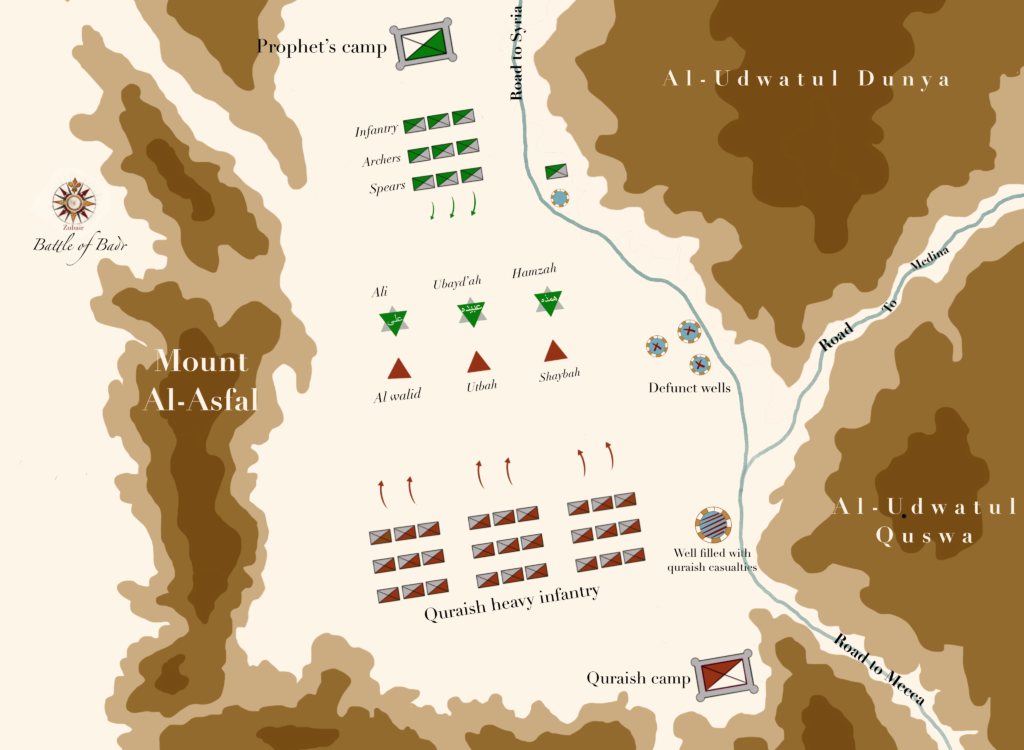The Battle of Badr: Muslim’s first great Victory
10/06/2020On March 13, 624, in Badr (130km southwest of Medina) a fateful battle was going on that would change the history of Islam forever, and why not the world? In 624, the year of the battle of Badr, Islam had only a few hundred converts, let it be said that they had migrated from Mecca to Medina in the event that was remembered forever in Islamic history as Hijrah, which means “migration“, and the community was mostly composed of underprivileged men, ex-slaves, women, and a few children.
Thus, the converts were led by the Prophet Muhammad, who sacrificed himself to spread the religion and establish Islamic monotheism in Arabia. However, after 12 years of persecutions patiently endured in Mecca, both he and his followers have become refugees.
Nevertheless, persecutions against the Prophet of Islam occurred before Hijrah, according to Ibn Ishaq and several other biographers of Muhammad. Among the humiliations and persecutions that we can mention, there is the episode in which Muhammad returned home covered in dung1, or when the bloody womb of a sheep was thrown into his house2, as well as other humiliations of this manner3, until finally they tried to kill him, causing the Hijrah in the year 622, and from that day on being the beginning of the Islamic calendar.
It turns out that Mecca was the commercial center of the time, also being part of one of the main routes of merchant caravans. Since Muhammad and Mecca were now at war, the Prophet of Islam decided to loot the enemy caravans, thus causing casualties in the Meccan’s cash flow, as well as forcing them to change course, which would generate several setbacks.
Some small incursions took place against the Meccan caravans, however, the tension would increase tremendously when the inhabitants of Mecca organized a caravan much larger than the previous ones, and precisely this one was the one that returned from Syria with the profit and products from the confiscation of goods of the Muslims who had migrated to Medina. Plundering that caravan, in addition to a throwback of something that was taken by force, could turn the tide, giving Muhammad and the Muslims an advantage. However, at the time it seemed just another ghazu4, with many Muslims committed to the religion choosing to stay at home, like Uthman ibn Affan, who decided to take care of his sick wife5.
Abu Sufyan, leader of the caravan aforementioned, interrogating people on the way he was traveling, soon learned of the ambush of Muhammad and the Muslims. This time, the battle took place due to the fact that the Muslims set up an ambush against a Quraysh caravan on the outskirts of the “Badr’s Well”. However, having previously been warned of Prophet Muhammad’s plans by a man named Damdam, the Meccans sent 1,000 men to protect the caravan. As the caravan was saved by the Meccan warriors, they ended up confronting the Muslims when they received the news that it had reached its destination safely. Behold, the battle of Badr begins.

Because they first arrived on the battlefield, Muslims were able to prepare him better. The thirsty Quraysh, after a long journey through the desert, ran to the wells, and there, shot down by arrows falling in the water. The corpses in the sun were rotting fast, making the fountains undrinkable for the rest of the approaching Meccan army, which was now losing its fundamental supply of water.
With the arrival of the rest of the army, the battle took place in the traditional way, that is, a warrior on each side facing each other. On one hand, the champions of Islam Ali, Ubaydah and Hamza, and on the other, al-Walid, Utbah and Shaybah, representing the pagans of Mecca. After the traditional demonstrations of bravery, with the Muslim champions killing the three opponents, the lines of combat advanced. The Meccans attacked the Muslims with blasts of arrows, responded in the same way by the followers of Muhammad, who in turn retaliated and managed to break the Meccan lines by killing several important leaders of the Quraysh. Other duels came, most of them with the Muslims coming out victorious, despite being poorly armed and outnumbered.
It turns out that although Muhammad commanded only three hundred soldiers against a thousand Meccan warriors, a three to one handicap, Muslims still managed to win the battle, taking only fourteen casualties while Mecca lost forty-five fighters (70, according to other sources). Among the losses of the Meccans was the leader of the thousand men, Abu Jahl, who was one of the Quraysh who most antagonized the Prophet during his life, and was also called “the Pharaoh of the Muslims” due to the persecutions and fierce torture carried out against Islam’s followers.
Such a victory was extremely important for the Muslims, as it not only increased their confidence but also strengthened Muhammad’s position in Medina. According to Professor Gregory S. Aldrete (2014, p.6), there are two factors that make a battle decisive:
- First, when a military force defeats the other and results in an immediate transfer of power. A variant in this sense is when the battle results in total (or almost) destruction of enemy forces;
- Second, perhaps the most common way, is when the battle does not seem to be so decisive at the time it was fought, but is later recognized as a turning point to one side.
The battle of Badr fits better into the second case. A decisive battle is when political and social changes occur, affecting the present and the future of the population. Thus, the battle may have a political, strategic or operational decision, contributing to a campaign or a war6. In the case of Badr, the victory was decisive regarding to social, political and religious issues in the context of the Arabian Peninsula.
Until the victory in Badr, the Muslims’ cause seemed hopeless, the Prophet himself being the target of all forms of persecution and even physical aggression for years. However, after such a significant victory, Muhammad and his teammates would be taken more seriously. In the eyes of Arabia, it was no longer that group of oppressed monotheists who suffered for years all kinds of misfortunes without even responding.
THE BATTLE OF BADR IN THE QURAN
On that day, hundreds of men fought in the battle of Badr, presuming to be referred to in the Holy Qur’an itself in Surah 8, The Spoils (Al Anfal), verse 1.
Even though the aforementioned Surah alludes to the strife that arose in the ummah (Islamic community) over the sharing of the booty acquired in battle, the same verse still teaches that Muslims must fear God and resolve their disputes peacefully.
After winning the battle, we have the report that seventy men were taken, prisoner. However, when the Muslims began to group them together for execution, according to the ancient Arab custom, but the Prophet intervened and commanded them to be treated in a cordial manner. In this regard, we see that Surah 76: 8 instructs Muslims on how to treat prisoners of war, insisting that they be fed and cared for. Another instance that occurred in Badr was that every literate pagan prisoner who could teach an illiterate Muslim to read and write would have his freedom.
Regarding the war prisoners, it is interesting to note the writings of William Muir, a 19th century author:
“In pursuance of Mahomet’s commands, the citizens of Medîna, and such of the Refugees as possessed houses, received the prisoners, and treated them with much consideration. “Blessings be on the men of Medina!” said one of these prisoners in later days; “they made us ride, while they themselves walked: they gave us wheaten bread7 to eat when there was little of it, contenting themselves with dates. It is not surprising that when, some time afterwards, their friends came to ransom them, several of the prisoners who had been thus received declared themselves adherents of Islam…Their kindly treatment was thus prolonged, and left a favourable impression on the minds even of those who did not at once go over to Islam”8
THE ARMY OF ANGELS
In the Islamic theological tradition, such a battle was not fought only by mortals, since Muslims received direct assistance from other servants of God: the angels. Many Muslims narrated that that day they saw a legion of angels fighting at their side. Muhammad knew about the angels who came to assist the true believers, for God said so in the Holy Quran, Surah 8, verse 9: “Indeed, I will reinforce you with a thousand from the angels, following one another.”
The presence of the angels could be felt by everyone at that moment, being the reason for the strengthening of the faithful and the terror of the infidels. However, such presence was visible (or audible) only for some, even varying in its intensity degrees. An example is that at the battle, when one of the faithful was chasing an enemy, before he could reach it him, his head flew out of his body, as if it were struck by an invisible hand.
On that day, the Muslims knew that they were on the right side, that God was with them and that if they were fearful, even an army of angels would come to their aid.
Notes
[1] See Muhammad ibn Ishaq, Sirat Rasul Allah 278, in A. Guillaume (org. e trad.), The Life of Muhammad (Londres, 1955), p. 191;
[2] Ibid;
[3] This without mentioning the physical agressions that Muhammad, his family members and followers suffered from the quraysh;
[4] The same as “raid”;
[5] See ARMSTRONG (2002, p. 193);
[6] See MARTIN (2011);
[7] A variety of “fast baked breads”, often called as “Irish bread”, depending on the recipe changing;
[8] See MUIR (1861, vol. 3, p. 122).
Bibliography
LINGS, Martin. Muhammad. His Life Based on the Earliest Sources;
ARMSTRONG, Karen.Maomé. Uma Biografia do Profeta. Companhia das Letras. 2002;
COLE, Juan.Muhammad. Prophet of Peace Amid the Clash of Empires. 2018;
HODGSON, Marshall Goodwin Simms.The Venture of Islam. The University of Chicago Press. Volume 1;
W. Montgomery Watt. Muhammad at Mecca. Oxford: Clarendon, 1953;
MUIR, William. The Life of Mahomet (Volume 3 ed.). London: Smith, Elder and Co. p. 122. 1861;
ALDRETE, Gregory S. The Decisive Battles of History. The Great Courses. 2014;
MARTIN, John K. Islam’s First Arrow: The Battle of Badr as a Decisive Battle in Islamic History and its Significance Today. Air University. 2011.
